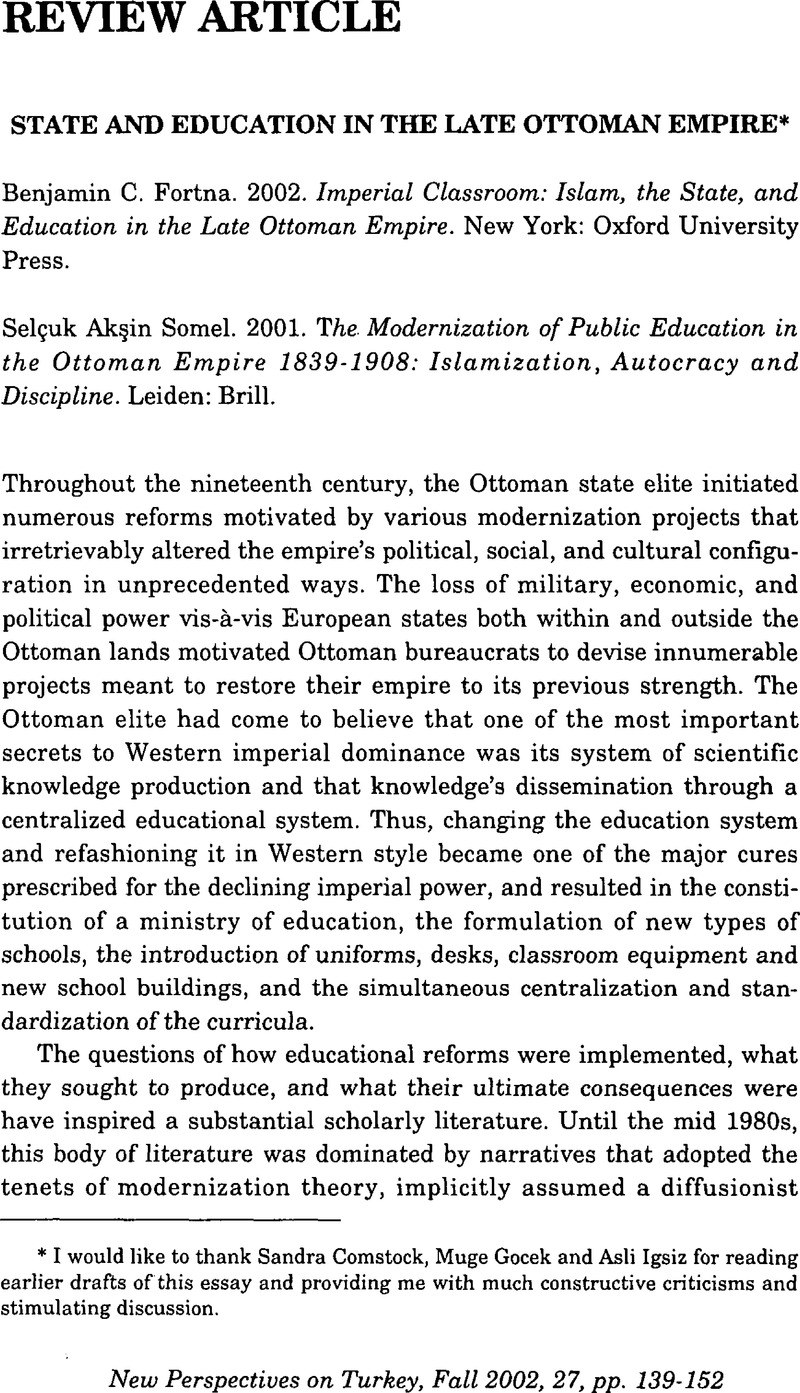No CrossRef data available.
Article contents
State and Education in the Late Ottoman Empire*
Review products
FortnaBenjamin C.. 2002. Imperial Classroom: Islam, the State, and Education in the Late Ottoman Empire. New York: Oxford University Press.
SomelSelçuk Akşin. 2001. The Modernization of Public Education in the Ottoman Empire 1839-1908: Islamization, Autocracy and Discipline. Leiden: Brill.
Published online by Cambridge University Press: 21 July 2015
Abstract
An abstract is not available for this content so a preview has been provided. Please use the Get access link above for information on how to access this content.

- Type
- Review Article
- Information
- Copyright
- Copyright © New Perspectives on Turkey 2002
Footnotes
*
I would like to thank Sandra Comstock, Muge Gocek and Asli Igsiz for reading earlier drafts of this essay and providing me with much constructive criticisms and stimulating discussion.
References
Berkes, Niyazi. 1964. The Development of Secularism in Turkey. Montreal: McGill University Press.CrossRefGoogle Scholar
Butler, Judith. 1997. The Psychic Life of Power. Stanford: Stanford University Press.CrossRefGoogle Scholar
De Certeau, Michel. 1984. The Practice of Everyday Life. Berkeley: University of California Press.Google Scholar
Chakrabarty, Dipesh. 1992. “Postcoloniality and the Artifice of History: Who Speaks for Indian Pasts?” Representations, 0(37) Winter, Special Issue: Imperial Fantasies and Postcolonial Histories, pp. 1–26Google Scholar
Davison, Roderic. 1961. “Westernized Education in Ottoman Turkey,” Middle East Journal, 15(3) Summer, pp. 289–301.Google Scholar
Davis, Natalie. 1987. Fiction in the Archives: Pardon Tales and Their Tellers in Sixteenth-Century France. Stanford: Stanford University Press.Google Scholar
Deringil, Selim. 1998. The Well-Protected Domains: Ideology and the Legitimation of Power in the Ottoman Empire, 1876-1909. London: Tauris.Google Scholar
Deringil, Selim. 2003 (forthcoming). “They Live in a State of Nomadism and Savagery,” Comparative Studies in Society and History.Google Scholar
Emirbayer, Mustafa. 1998. “What is Agency?” The American Journal of Sociology, 103(4) January, pp. 962–1024.CrossRefGoogle Scholar
Findley, Carter. 1989. Ottoman Civil Officialdom: A Social History. Princeton: Princeton University Press.CrossRefGoogle Scholar
Göçek, Fatma Müge. 1996. Rise of the Bourgeoisie, Demise of Empire: Ottoman Westernization and Social Change. New York: Oxford University Press.CrossRefGoogle Scholar
Gür, Aslı. 2000. “Educating the Orient: Robert College, an American Institution of Higher Education in Constantinople 1863-1883,” paper presented at the student conference of the Advanced Studies Seminar: Empires and Political Imagination, at University of Michigan, Ann Arbor.Google Scholar
Hanioğlu, Şükrü. 1995. Young Turks in Opposition. New York: Oxford University Press.CrossRefGoogle Scholar
Hanioğlu, Şükrü. 2000. Preparation for a Revolution: The Young Turks, 1902-1908. New York: Oxford University Press.Google Scholar
Kazamias, Andreas. 1966. Education and the Quest for Modernity in Turkey. Chicago: University of Chicago Press.Google Scholar
Koçer, Hasan Ali. 1970. Türkiye'de Modern Eğitimin Doğuşu ve Gelişimi, 1773-1923. Istanbul: Milli Eğitim Basımevi.Google Scholar
Lewis, Bernard. 1968. The Emergence of Modern Turkey. London: Oxford University Press.Google Scholar
Ozbek, Nadir. 1999. “The Politics of Poor Relief in the Late Ottoman Empire: 1876-1914,” New Perspectives on Turkey, 21 Fall, pp. 1–33.CrossRefGoogle Scholar
Sewell, William H. Jr. 1992. “A Theory of Structure: Duality, Agency, and Transformation,” The American Journal of Sociology, 98(1) July, pp. 1–29.CrossRefGoogle Scholar
Sohrabi, Nader. 2002. “Global Waves, Local Actors: What the Young Turks Knew about Other Revolutions and Why It Mattered,” Comparative Studies in Society and History, 44(1), pp. 45–79CrossRefGoogle Scholar
Sohrabi, Nader. 1995. “Historicizing Revolutions: Constitutional Revolutions in the Ottoman Empire, Iran, and Russia, 1905-1908,” The American Journal of Sociology, 100(6), pp. 1383–1448.CrossRefGoogle Scholar
Stoler, Ann. “Colonial Archives and the Arts of Governance on the Content in the Form,” in Hamilton, Carolyn (Ed.), Refiguring the Archive, Kluwer Academic Publishers, forthcoming (November 2002).Google Scholar
Unat, Faik Reşit. 1964. Türkiye Eğitim Sisteminin Gelişmesine Tarihi Bir Bakış. Ankara: MEB Yayınevi.Google Scholar


